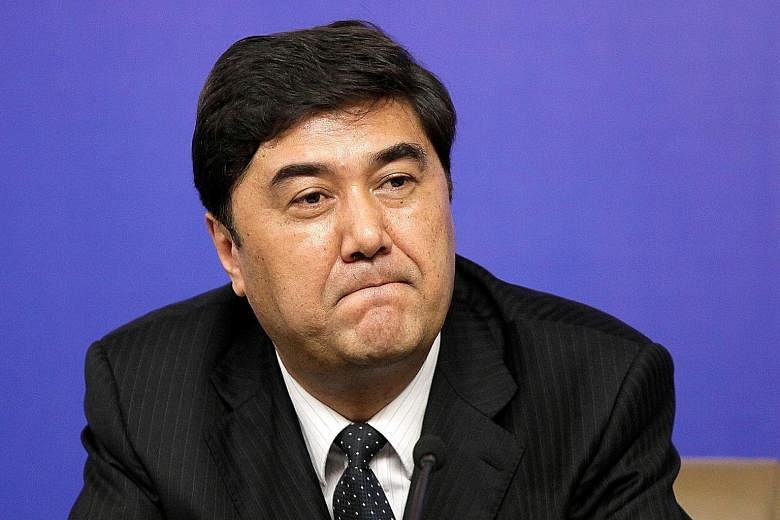BEIJING • China has placed one of the country's most senior ethnic Uighur officials, head of the energy administration and a former governor of the restive region of Xinjiang, under investigation for suspected graft.
The ruling Communist Party's anti-graft watchdog said in a brief statement yesterday that National Energy Administration director Nur Bekri was being probed on suspicion of breaking the law and violating party discipline, the usual euphemism for graft but which could also refer to other legal problems.
It was not possible to reach Nur Bekri for comment.
The administration said in a statement it had held a meeting to express its full support for the probe, and that officials recognised the "serious and complex" nature they faced in the anti-corruption fight.
Administration officials all agreed that "Nur Bekri's being suspected of serious discipline and legal breaches has caused serious harm and has had a negative effect on the energy sector", it said.
President Xi Jinping has targeted the energy sector as part of a wider war against pervasive graft that began when he came into office six years ago.
Nur Bekri, 57, worked in Xinjiang until he moved to Beijing in late 2014 to head the energy administration. He is also a deputy head of China's powerful state planning agency, the National Development and Reform Commission.
Nur Bekri, a tall, jocular figure who speaks almost totally unaccented Mandarin and is known for being more open to foreign media than most Chinese officials, is the 12th senior official from the energy administration to be felled since it was founded in 2008.
In Xinjiang, he had been a strong proponent of expanding the resource-rich region's coal-mining sector, but his advocacy for the polluting industry was tempered in favour of promoting cleaner projects after he came to Beijing.
He is one of the few Uighurs - a Muslim people who speak a Turkic language and who call Xinjiang home - to have broken through and made it to a top national-level job in Beijing.
He had been in Moscow on Tuesday attending an official event on China-Russia investment, according to China's state planner.
Xinjiang is one of China's most violent regions, with hundreds killed in unrest between the minority Uighurs and the majority Han Chinese in recent years.
Nur Bekri was Xinjiang's governor from 2008 until 2014, a time that saw bouts of ethnic violence that included deadly rioting in the region's capital, Urumqi, in 2009.
During his time in that position, which ranks below the Communist Party secretary, Nur Bekri was a proponent of restrictions placed on religious practices of the largely Muslim ethnic minorities there, ostensibly to curb what the government said was the spread of extremist ideology.
Nur Bekri had also touted bilingual education for Uighurs in schools as a route to economic opportunity, although critics said in reality that meant marginalising the Uighurs' own language and culture in favour of Chinese.
REUTERS

